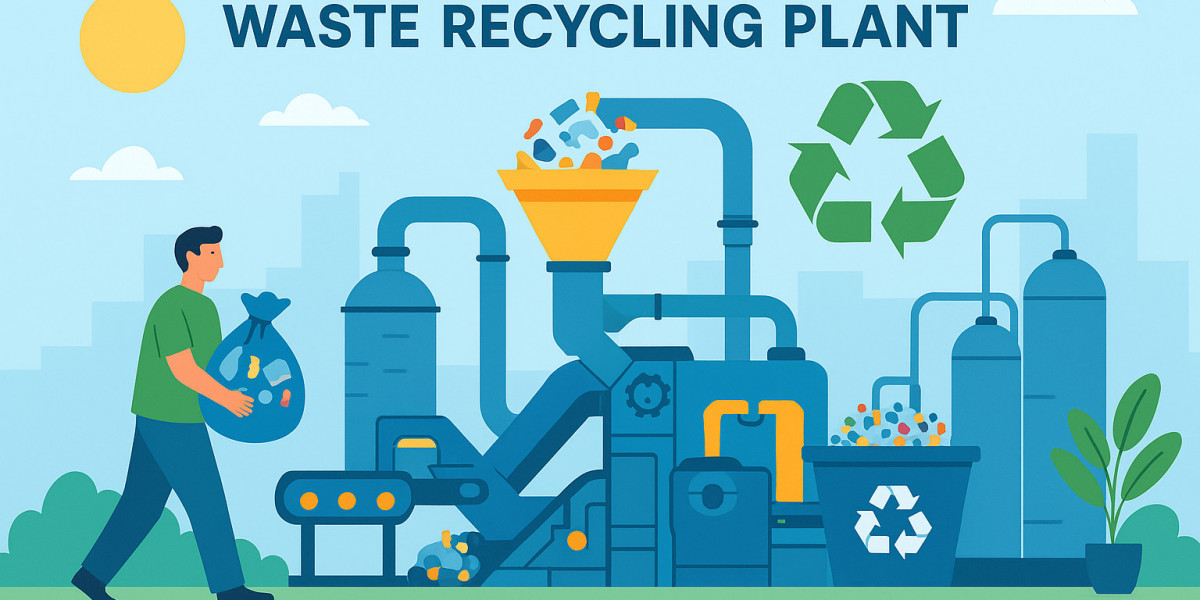Understanding Plastic Waste Recycling Plant
Plastic waste recycling in India has gained a huge momentum, as cities produce tons of plastic every day, most of which ends up in landfills. As a result of this the government bodies are moving towards adopting more sustainable solutions. Setting up a Plastic waste recycling plant offers industries chance to transform discarded plastic wastes into something useful. A plastic recycling business not only gains profit but also contributes in the reduction of environment pollution. There are multiple industries which depend on recycled plastic for instance consumer goods, construction and packaging.
Recently, there are numerous businesses which are now working with trusted plastic recycling company in India to start their operations seamlessly without any legal interruptions. With appropriate management, a plastic recycling plant can provide stable income while contributing the Circular economy.
Why Start a Plastic Waste Recycling Plant?
Plastic has become daily necessity, with the increasing use of plastic in our day to day life recycling has become important than ever. Recycling helps reduce waste, pollution, and conserves valuable natural resources.
For business owners, the plastic recycling business is gaining importance. The industrial demand is shifting towards affordable and eco-friendly raw materials. Several government initiatives are also supporting recycling and offering loans and promoting plastic waste management programs.
Benefits of Plastic Recycling
Plastic recycling not only benefits the environment but it’s also economically rewarding. It helps the community stay cleaner while supporting businesses to earn profit. Some of its key benefits include:
· Minimizes Environmental Pollution: Plastic recycling reduces the chances of waste reaching landfills and oceans. Additionally, it also lowers the pollution level and contributes to sustainable development.
· Saves natural resources: By recycling plastic and then reusing it results in less extraction of oil, water and helps save natural resources.
· Creates employment opportunities: Recycling plants also helps in creating local jobs in waste collection, sorting, processing, and product distribution.
· Ensures consistent revenue: By selling high- quality recycled plastic to businesses provides a stable and long-term source of income for recycling businesses.
· Supports government goals: Recycling contributes to national efforts encouraging sustainable development, clean cities, and accountable for healthier environment.
Types of Plastic Waste Processed
A Plastic waste recycling plant setup has to deal with different kinds of plastic waste every single day. Each type require proper approach for segregation, cleaning and shredding. Some of the main types include:
· Polyethylene Terephthalate (PET): This type is usually found in water bottles and food packaging. PET is later segregated, cleaned, and transformed into granules or pellets suitable for making bags, new bottles, construction materials etc.
· High-Density Polyethylene (HDPE): HDPE is sourced from shampoo bottles, drums, and dairy packages. After recycling, it’s used in making pipes, crated and strong packaging and storage materials.
· Polypropylene (PP): It is derived from products such as caps, food boxes, and automotive parts. It is processed into sheets or pellets, which is later used for making reusable containers and industrial items.
· Low-Density Polyethylene (LDPE): It is found in films, wraps, or plastic bags. LDPE is converted into granules, and used for creating recycled goods like bags, packaging films, and construction materials.
Documents Required for a Plastic Waste Recycling Plant
Starting a plastic recycling company in India requires proper documentation to comply with government norms and avoid future disputes. The following are the key documents:
· Business Registration (LLP, Pvt Ltd, or proprietorship certificate)
· GST Registration
· Pollution Control Certificate from State Pollution Control Board
· Factory or Plant License
· Trade License from local authorities
· Consent to Operate (CTO) from pollution control authorities
Process of Starting a Plastic Waste Recycling Plant
Setting up a Plastic waste recycling plant needs mindful planning and proper steps to ensure smooth operations. The plastic recycle plant registration process include:
1. Market Research: Start by performing market research study local and industrial demand and the availability of plastic waste in your area before starting.
2. Collect Documents: Start by registering your business and collect all the necessary documents such as PAN, GST, etc.
3. Location and Infrastructure: Select a suitable location with space for collection, washing, grinding, and handling of plastic.
4. Obtain Environmental Clearance (EC): For obtaining Environmental clearance, apply to the State Pollution Control Board (SPCB) for environmental clearance. This ensures your plastic recycle plant comply with all environmental safety standards and waste management rules.
5. Apply for Waste Management Authorization: Get authorization under the Plastic Waste Management Rules. It permits your plastic recycling plant to lawfully collect, store, and process plastic waste in adherence with Indian protocols.
6. License Approval: The authorities will examine your site. Once verified, you’ll receive the official license to start your plastic waste recycling plant officially.
Conclusion
Starting a Plastic recycling business in India has huge potential, both profitable and social. It provides waste a second life while supporting industries and environment. A plastic recycle company in India can convert waste plastics into a valuable and affordable items. It is important to plan layout before setting up a plant, it is best to choose location closer to raw materials. Additionally, by setting up a plastic recycling company in India not only profits entrepreneurs but also creates employment opportunity and promotes environmental well-being. With dedication, the right technology, and effective partnerships, a plastic recycling plant can become a sustainable, rewarding, and impactful business venture.








